Lecture Series
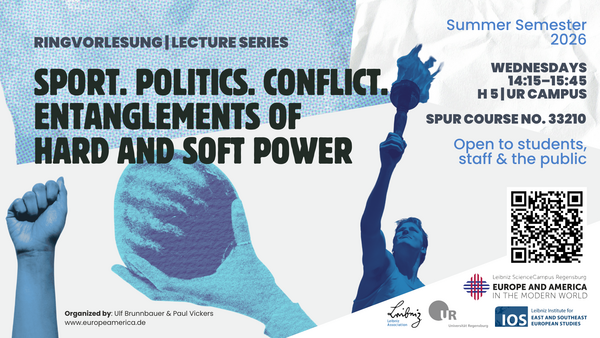 The ScienceCampus organizes regular lecture series in collaboration with partners in Regensburg featuring contributions from scholars from UR and IOS, as well as by visiting researchers. The next series takes place in summer semester 2026. Sport. Politics. Conflict: Entanglements of Hard and Soft Power will take place on Wednesdays at 14:15-15:45 in H5 at UR main campus.UR students can sign up for the course from 26 January 2026 - SPUR course number 33210. Any students can take the course for credits. All students, staff and the public are welcome to join the individual talks or take the whole course. Click here to find out more about the lecture series and find out more details of what is in the programme.
The ScienceCampus organizes regular lecture series in collaboration with partners in Regensburg featuring contributions from scholars from UR and IOS, as well as by visiting researchers. The next series takes place in summer semester 2026. Sport. Politics. Conflict: Entanglements of Hard and Soft Power will take place on Wednesdays at 14:15-15:45 in H5 at UR main campus.UR students can sign up for the course from 26 January 2026 - SPUR course number 33210. Any students can take the course for credits. All students, staff and the public are welcome to join the individual talks or take the whole course. Click here to find out more about the lecture series and find out more details of what is in the programme.
The ongoing research at the ScienceCampus and contributions to the past lecture series provided the foundation for the online lecture series available via the Bavarian Virtual University (vhb). You can access those materials via this link. The Open Educational Resource is accessible around the world and can be incorporated into teaching as part of blended learning.
Online Lecture Series
European-American Entanglements in the Modern World
The videos are available and outlined below. The full set of units for the interactive lecture series European-American Entanglements in the Modern World is available here. The videos feature both English and German subtitles, with the learning activities currently only available in German.
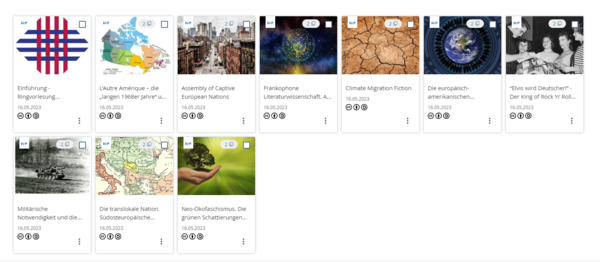 The series is hosted at the virtuelle hochschule bayern (vhb)/ Bavarian virtual university, and was produced in collaboration with the Centre for University and Academic Teaching (ZHW) at UR. The project was coordinated at the ScienceCampus by Judith Steinmetz who has as a research assistant did an incredibly professional job in getting this project online. We would like to thank everyone, including visiting professors of the ScienceCampus, who have contributed videos, Claudia Sadowski-Smith, Jean Marc Moura, Anna Mazurkiewicz, Campus doctoral researchers Jon Matlack and Thalia Prokopiou, and colleagues from IOS Regensburg and UR: Ulf Brunnbauer, Gerlinde Groitl Mathias Häußler, and Dagmar Schmelzer, who have contributed to series. The preview includes an introduction by Paul Vickers and Judith Steinmetz, too.
The series is hosted at the virtuelle hochschule bayern (vhb)/ Bavarian virtual university, and was produced in collaboration with the Centre for University and Academic Teaching (ZHW) at UR. The project was coordinated at the ScienceCampus by Judith Steinmetz who has as a research assistant did an incredibly professional job in getting this project online. We would like to thank everyone, including visiting professors of the ScienceCampus, who have contributed videos, Claudia Sadowski-Smith, Jean Marc Moura, Anna Mazurkiewicz, Campus doctoral researchers Jon Matlack and Thalia Prokopiou, and colleagues from IOS Regensburg and UR: Ulf Brunnbauer, Gerlinde Groitl Mathias Häußler, and Dagmar Schmelzer, who have contributed to series. The preview includes an introduction by Paul Vickers and Judith Steinmetz, too.
The themes covered include current and historical migration, environmental issues, Cold War history and its political legacies, Québec's independence movement and postcolonial linguistic and literary entanglements of the Francophone world, and the transatlantic circulations of popular culture.
The aim of the course is to provide insights into empirical area studies research and diverse methods. The units can be used by students, the public, or as part of blended learning by university teachers and lecturers. The materials should be accessible to all, likewise outside Bavaria. The materials are currently available on the OER format, as part of the ScienceCampus' commitment to Open Science. In Winter Semester 2023/24, we will also provide the materials within the vhb Smart format, enabling their incorporation into Bavarian higher education institutions' curricula.
Programme
Talk 1 | Paul Vickers and Judith Steinmetz (U Regensburg)
Introduction
Talk 2 | Dagmar Schmelzer (U Regensburg)
L‘Autre Amérique – die „langen 1968er Jahre“ und die Oktoberkrise 1970 in Québec
Talk 3 | Anna Mazurkiewicz (U Gdansk)
Assembly of Captive European Nations
Talk 4 | Jean-Marc Moura (U Paris Nanterre)
Frankophone Literaturwissenschaft. Auf dem Weg zu einer transatlantischen Literaturgeschichte
Talk 5 | Claudia Sadowski-Smith (Arizona State U)
Climate Migration Fiction
Talk 6 | Gerlinde Groitl(U Regensburg)
Die europäisch-amerikanischen Sicherheitsbeziehungen
Talk 7 | Mathias Häußler (U Regensburg)
“Elvis wird Deutscher!” – Der King of Rock ‘n’ Roll und das Aufkommen einer transatlantischen Jugendkultur
Talk 8 | Jon-Wyatt Matlack(LSC/U Regensburg)
Militärische Notwendigkeit und die "westliche" Art des Kriegs
Talk 9 | Ulf Brunnbauer(U Regensburg)
Die translokale Nation. Südosteuropäische Diasporas in den USA vor 1914
Talk 10 | Thalia Prokopiou (U Regensburg)
Neo-Ökofaschismus. Die grünen Schattierungen der Neofaschisten
Past Events
The ScienceCampus will be offering a lecture series (Ringvorlesung) which is open to UR students, staff at UR and IOS, as well as the general public. It will run on Wednesdays at 14:15–15:45 throughout the Winter Semester 2024/25. Students can sign up from 8 July via Campusportal / Spur, the UR course programme database. Downloaded the programme here as a poster.
Anmeldung für Studierende | Student registration here
Deutsche Kursbeschreibung folgt unten
In view of current wars and upheavals in the international order, this lecture series explores the themes of "War. Peace. Security". Renowned academics from the University of Regensburg as well as external experts will provide in-depth insights. They will discuss the question of how and why wars break out, how they can be ended and which institutions prevent wars. They will draw on a variety of disciplinary perspectives and regional focuses, turning to concrete empirical examples in past and present. The focus will be on the following topics:
- Development of international law and international organisations, including the EU, in response to experiences of war
- Challenges and transformations of the global security architecture
- Warfare and cultures of violence
- Memories and media representations of war
- Ending war, creating peace
Languages: English and German
When? Wednesdays, 2:15 p.m.
Where? H 26, UR Campus
Angesichts aktueller Kriege und Erschütterungen der internationalen Ordnung wird sich diese Ringvorlesung dem Thema “Krieg. Frieden. Sicherheit” widmen. Zu Wort kommen namhafte Wissenschaftler*innen der Universität Regensburg sowie Expert*innen von außen. Sie werden aus unterschiedlichen disziplinären Perspektiven und regionalen Schwerpunkten anhand konkreter Beispiele aus Vergangenheit und Gegenwart die Frage diskutieren, wie und warum Kriege ausbrechen, wie man diese beenden kann und welche Institutionen Kriege verhindern. Im Vordergrund stehen folgende Themen:
- Entwicklung des Völkerrechts und internationaler Organisationen, wie der EU, als Antwort auf Kriegserfahrungen
- Herausforderungen und Transformationen der globalen Sicherheitsarchitektur
- Kriegsführung und Gewaltkulturen
- Erinnerungen und mediale Repräsentationen von Krieg
- Krieg beenden, Frieden schaffen
Sprachen: Deutsch und Englisch
Zeit und Ort: Mittwochs, 14:15 Uhr, H 26 (UR Campus)
Programme:
16.10.2024 | Eiki Berg (University of Tartu)
Digging in the Dirt: ‘No War, No Peace and Not Too Much Killing’
23.10.2024 | Robert Uerpmann-Wittzack (Universität Regensburg)
Krieg. Frieden. Sicherheit als Auftrag des Völkerrechts
30.10.2024 | Harriet Rudolph (Universität Regensburg)
Der Westfälische Frieden (1648) – eine Blaupause für aktuelle Friedens- und Sicherheitskonzepte?
06.11.2024 | Generalleutnant a. D. Erhard Bühler (Berlin)
Die Sicherheitsordnung Deutschlands, Europas und der Welt
13.11.2024 | Ruth Ferrero-Turrión(Complutense University of Madrid (UCM) & Complutense Institute for International Studies (ICEI) Madrid)
Building Geopolitical Europe: Challenges and uncertainties
Postponed – fällt aus 20.11.2024 | Cindy Wittke (IOS Regensburg)
Buchvorstellung: Frieden verhandeln im Krieg. Russlands Krieg, Chancen auf Frieden und die Kunst des Verhandelns
27.11.2024 | 2024 LSC Annual Conference | 14:00–15:30 – online via Zoom or via live stream in H26
Playing War: Simulations, games, exercises, and the representations of military force and violence: Panel on “A School of War" – Notes on the History of the Prussian Kriegsspiel with Jorit Wintjes, Steffen Pielström and Pia Hoffmann (all Würzburg) - register via the link in the title for access to the Zoom Link
04.12.2024 | Guido Hausmann (IOS Regensburg)
Deutschland und die Frage der Staatlichkeit der Ukraine von Brest-Litowsk (1918) bis heute
11.12.2024 | Thomas Steger (Universität Regensburg) & Taras Danko (National Technical University "Kharkiv Polytechnic Institute")
The Impact of War on Management and Organizational Practices: A critical inquiry
18.12.2024 | Siarhei Bohdan(Universität Regensburg)
Continuation of Foreign Policy with Other Means: Syria's support for armed opposition movements abroad during the Cold War
08.01.2025 | Ralf Junkerjürgen (Universität Regensburg)
Die Legion Condor im Kino. Der Film Solange du lebst (Harald Reinl, 1955) im Kontext von Remilitarisierung und Aufarbeitung in der Nachkriegszeit
15.01.2025| Jana Hönke (Universität Bayreuth, Bayerische Wissenschaftsallianz für Friedens-, Konflikt- und Sicherheitsforschung) | in cooperation with Bayreuth Peace Talks
South-South Security Arrangements and Postcolonial Hierarchies
22.01.2025 | Nikola Gajić (IOS Regensburg)
(Un)conditional Europeanisation: Memory politics in Serbia surrounding the Yugoslav wars and EU integration
29.01.2025 | Christian von Soest (Georg-August-Universität Göttingen/German Institute for Global and Area Studies – GIGA Berlin)
Aufstieg eines außenpolitischen Instruments: Wie Sanktionen wirken
05.02.2025 | Heiner Bielefeldt (Friedrich-Alexander-Universität Erlangen, Bayerische Wissenschaftsallianz für Friedens-, Konflikt- und Sicherheitsforschung)
Die Idee des Rechtsfriedens: Zur Aktualität der Kantischen Perspektive
12.02.2025 | – Exam for students
Climate Change: Action and Law in the Global South and Beyond the West
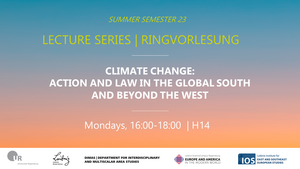 This lecture series adresses one of the pressing questions of human kind – climate change. It approaches this issue from different disciplines ranging from law to ethnography. Legislation and especially the Paris Agreement have been a step towards international cooperation in combating climate change – now actions and implementation need to follow. Questions about deforestation, litigation, the circular economy, and sustainable urban planning will be adressed in different regions in the Global South and beyond the West.
This lecture series adresses one of the pressing questions of human kind – climate change. It approaches this issue from different disciplines ranging from law to ethnography. Legislation and especially the Paris Agreement have been a step towards international cooperation in combating climate change – now actions and implementation need to follow. Questions about deforestation, litigation, the circular economy, and sustainable urban planning will be adressed in different regions in the Global South and beyond the West.
Summer Semester 2023 | Mondays | 16:15–17:45 | H14
Organized by Prof. Dr. Rike Krämer-Hoppe (DIMAS/ Law, UR) and Dr. Paul Vickers (DIMAS / ScienceCampus)
Programme
17 April | Rike Krämer-Hoppe (Regensburg) & Paul Vickers (Regensburg)
Introduction
– recommended for students only
24 April | Tiago Fensterseifer (São Paulo)
Climate Change Litigation in Brazil
The lecture will address current climate litigation action in Brazil as well as the recent political change and the new opportunities that come with it. In a recent decision the Supremo Tribunal Federal (STF, Supreme Court of Brazil) declared the Paris Agreement a human rights treaty.
8 May | Maria Cecilia Oliveira (Potsdam) and Michael Riegner (Erfurt)
Film & Discussion | Jatun Yaku: Amazon of Rights
Jatun Yacuis the indigenous name, in Quechua language, for one of the tributaries of the Amazon river in Ecuador. As the Amazon river flows from its source to the Atlantic Ocean, it crosses four countries with different legal systems. This pilot documentary film traces the ebb and flow of rights in and of the Amazon across space and time, ethnographically exploring the question of what it means for a river to have rights, where these rights come from and what they might look like visually. The session will include a showing of the film as well as discussion with its creators, Maria Cecilia Oliveira (Potsdam) and Michael Riegner (Erfurt).
15 May | Yi Yi Prue (Dhaka, Bangladesh)
Climate Litigation within and outside of Bangladesh
The lecture will dive into the climate issues pressing in Bangladesh. It will adress litigation efforts in Bangladesh as well as in Germany.
22 May | Yvonne Donders (Amsterdam)
The Human Rights Commission and the Torre Strait Decision
The lecture will give an overview of the UN Human Rights Committee and its work. The Torre Strait Decision is a landmark decision of the Committee in which it found that Australia's failure to adequately protect indigenous Torres Strait Islanders against adverse impacts of climate change was a breach of the International Covenant on Civil and Political Rights.
5 June | Simone Sandholz (Bonn)
Urban Climate Action in Cities
The lecture elaborates the possibilities as well as necessities for the transformation of urban planning. Especially in the global south cities need to adapt to climate change.
12 June | Christiane Heibach (Regensburg)
Ecology and Art: Aesthetic Engagement on Climate Change
19 June | Rike Krämer-Hoppe (Regensburg) – via Zoom, not in H14
The German Federal Constitutional Court Climate order and the Global South
26 June no talk this week
3 July | double header of talks by doctoral researchers at the Graduate School for East and Southeast European Studies at UR
Magdolna Molnar (Regensburg) – Common misconceptions about sustainability: Examples from the European Green Deal
Miloš Đurović (Regensburg) – Reflecting on the visions and practices of “environmental sustainability” between the European centre and its periphery
In this session, two doctoral researchers based at the Graduate School for East and Southeast European Studies at UR will present talks based on their ongoing research. Magdolna Molnár (Regensburg) will disscuss "Common misconceptions about sustainability: Examples from the European Green Deal" while Miloš Đurović (Regensburg) will be "Reflecting on the visions and practices of “environmental sustainability” between the European centre and its periphery". Magdolna Molnár will focus on the issue of European waste recycling policy, looking in particular at efforts to establish circular economy practices with electronic waste. Miloš Đurović reflects on the notion of environmental sustainability – its conceptualisation, implementation, and multifaceted and blurry character – focusing mainly on the nexus between the European centre and its periphery.
The talks take place in person in H14 and all are welcome to attend. Outlines of the talks are available below.
10 July Oliver C Ruppel (Graz / Stellenbosch U)
Climate Litigation and Action in Africa
This lecture will address pressing climate issues from an African perspective. It will inter alia elaborate on selected litigation efforts and other climate activities in selected African countries.
17 July for students only: Klausur/Test!
Frictions and Transformations of Globalization
In cooperation with the Center for International and Transnational Area Studies (CITAS) at the University of Regensburg; the program is available here to download and outlined below.
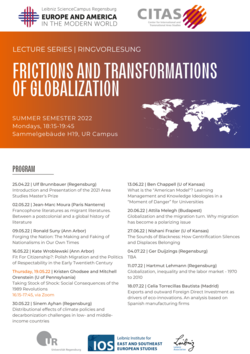
Motion produces frictions. These have the potential to stall, inhibit or halt shifts. But frictions also release energy, thus producing new movements. Whether in large-scale tectonic shifts or micro-level encounters, interactions between people, technologies, ideas, natural conditions, and the flows of capital and goods shape the diverse, long-term and often contradictory processes termed globalization. It has become apparent that globalization is neither a smooth nor unidirectional process; but rather it is something that undergoes constant challenges, re-direction, and re-appropriation so that its course is neither predictable nor controllable. Nor, for that matter, has globalization led to convergence; rather it has given rise to new divergences across and within countries and continents.
This lecture series focuses on three interlinked elements that are crucial to understanding globality in its diversity across multiple spaces and throughout history: the environment, migration and labor. Drawing on the expertise of colleagues in Regensburg and around the world, the lecture series will offer interdisciplinary perspectives informed by area studies that combine macro-perspectives and critical place-oriented scholarship, in order to highlight the intersections between different scales. Rather than posit a seamless globalization, the speakers highlight the productive and destructive frictions emerging from the interaction and interdependencies between local action and large-scale forces. In this story, natural resources, mobility and human labor are paramount.
The lectures will offer insights on Eastern and Western Europe, North and South America, indicating connections to other world regions and worldwide institutions, as well as highlighting how the global condition is made and remade in local sites and through translocal connections.
Speakers include academics from Regensburg, visiting fellows of the Leibniz ScienceCampus from the USA and Spain, as well as invited guests from Germany and abroad.
Summer Semester 2022 | Mondays | 18:15–19:45 | H19 (Sammelgebäude)
Programme
click the links for more details
25 April | Ulf Brunnbauer (IOS Regensburg)
Introduction; Presentation of the Award-Winning Students in the 2021 Area Studies Master’s Prize
02 May | Jean-Marc Moura (Paris Nanterre)
Francophone Literatures as Migrant Literatures. Between a Postcolonial and a Global History of Literature
09 May | Ronald Suny (U Michigan, Ann Arbor)
Forging the Nation: The Making and Faking of Nationalisms in Our Own Times
16 May | Kate Wroblewski (U Michigan, Ann Arbor)
Fit For Citizenship?: Polish Migration and the Politics of Respectability in the Early Twentieth Century
Thursday 19 May, 16:15 via Zoom | Kristen Ghodsee and Mitchell Orenstein (University of Pennsylvania)
Taking Stock of Shock: Social Consequences of the 1989 Revolutions
30 May | Sinem Ayhan (IOS Regensburg)
Distributional Effects of Climate Policies and Decarbonization Challenges in Low- and Middle-Income Countries
13 June | Ben Chappell (U Kansas)
What is the "American Model"? Learning Management and Knowledge Ideologies in a “Moment of Danger” for Universities
20 June | Attila Melegh (Corvinus U, Budapest)
Globalization and the Migration Turn. Why Migration Has Become a Polarizing Issue
27 June | Nishani Frazier (U Kansas)
The Sounds of Blackness: How Gentrification Silences and Displaces Belonging
04 July | Ger Duijzings (UR)
Between Europeanisation and Waste Colonialism: Dirty Dumping at the Periphery of Europe
11 July | Hartmut Lehmann (IOS Regensburg)
Globalization, Inequality and the Labor Market – 1970 to 2010
18 July | Celia Torrecillas Bautista (Complutense, Madrid)
Exports and Outward Foreign Direct Investment as Drivers of Eco-Innovations. An Analysis Based on Spanish Manufacturing Firms
25 July | Exam/Klausur
Rethinking Area Studies and Space from the "Global South"? Post/Colonial Perspectives and Glocal Challenges
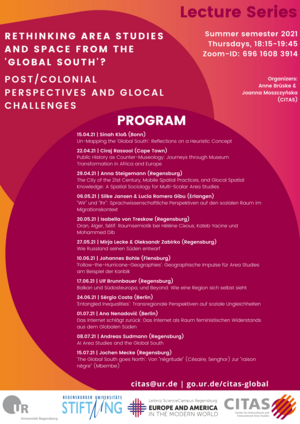 Area Studies is a per se interdisciplinary research field that can contribute fruitfully to understanding societies and cultures in the context of both historical and ongoing globalization processes. Nevertheless, owing to their specific genealogy, area studies have also faced critique in respect of their methods, theories and thematic foci. Even if there has been a turn towards critical self-reflection in area studies, leading to increasing recognition of the field’s imperial and colonial legacies, voices from the different world regions constituting its focus nevertheless remain underrepresented – those from Asia, Africa, the Americas, and East and Southeast Europe in particular. In order to better understand cultures and societies in respect of their glocal power relations, it is necessary to explore how area studies and space can be contextualized through the perspectives of the ”Global South” and what role, for example, virtual spaces (could) play in this.
Area Studies is a per se interdisciplinary research field that can contribute fruitfully to understanding societies and cultures in the context of both historical and ongoing globalization processes. Nevertheless, owing to their specific genealogy, area studies have also faced critique in respect of their methods, theories and thematic foci. Even if there has been a turn towards critical self-reflection in area studies, leading to increasing recognition of the field’s imperial and colonial legacies, voices from the different world regions constituting its focus nevertheless remain underrepresented – those from Asia, Africa, the Americas, and East and Southeast Europe in particular. In order to better understand cultures and societies in respect of their glocal power relations, it is necessary to explore how area studies and space can be contextualized through the perspectives of the ”Global South” and what role, for example, virtual spaces (could) play in this.
This interdisciplinary lecture series therefore offers a multiperspectival reconceptualization of area studies and relevant concepts of space in dialog with the ”Global South”. The series seeks to demonstrate the necessity of revising certain scholarly and cultural paradigms, while pointing towards ways of achieving dialogic reconfigurations of knowledge production.
The interdisciplinary and transcultural lecture series features (inter)national experts with case studies and theoretical contributions from fields including social anthropology, museum studies, history, sociology, linguistics, cultural studies, literary studies and media studies. Alongside specialists from Regensburg, there will also be contributions from Ciraj Rassool (University of the Western Cape, South Africa), Sérgio Costa (Lateinamerika-Institut Berlin), Sinah Kloß (Dependency and Slavery Studies, Universität Bonn), Silke Jansen (FAU Erlangen), Ana Nenadovic (Lateinamerika-Institut Berlin) and Johannes Bohle (Europa-Universität Flensburg).
Coordinators: Prof. Dr. Anne Brüske und Joanna Moszczynska
Summer Semester 2021 | Thursdays | 19:45–18:15 | Via Zoom
Programme
15 April | Sinah Kloß (Bonn)
Un-Mapping the 'Global South': Reflections on a Heuristic Concept
22 April | Ciraj Rassool (Cape Town)
Public History as Counter-Museology: Journeys through Museum Transformation in Africa and Europe
29 April | Anna Steigemann (Regensburg)
The City of the 21st Century, Mobile Spatial Practices, and Glocal Spatial Knowledge: A Spatial Sociology for Multi-Scalar Area Studies
6 May | Silke Jansen & Lucía Romero Gibu (Erlangen)
"Wir" und "Ihr": Sprachwissenschaftliche Perspektiven auf den sozialen Raum im Migrationskontext
20 May | Isabella von Treskow (Regensburg)
Oran, Alger, Sétif: Raumsemiotik bei Hélène Cixous, Kateb Yacine und Mohammed Dib
27 May | Mirja Lecke & Oleksandr Zabirko (Regensburg)
Wie Russland seinen Süden entwarf
10 June | Johannes Bohle (Flensburg)
'Follow-the-Hurricane-Geographies': Geographische Impulse für Area Studies am Beispiel der Karibik
17 June | Ulf Brunnbauer (Regensburg)
Balkan und Südosteuropa, und Beyond: Wie eine Region sich selbst sieht
24 June | Sérgio Costa (Berlin)
'Entangled Inequalities': Transregionale Perspektiven auf soziale Ungleichheiten
1 July | Ana Nenadović (Berlin)
Das Internet schlägt zurück: Das Internet als Raum feministischen Widerstands aus dem Globalen Süden
8 July | Andreas Sudmann (Regensburg)
KI Area Studies und der Globale Süden
15 July | Jochen Mecke (Regensburg)
'The Global South goes North': Von "négritude" (Césaire, Senghor) zur "raison nègre" (Mbembe)
Special Relations Revisited: Europa und die USA seit dem 19. Jahrhundert
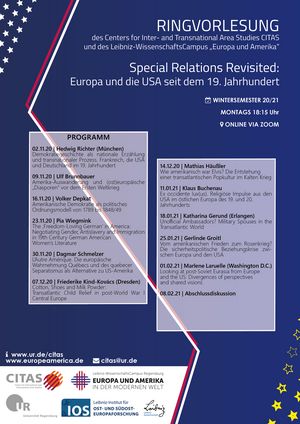 The lecture series "Special Relations Revisited" examined European-American entanglements in topics such as foreign affairs and security policy, diplomacy and migration policy, and more. Moving in a mostly chronological order, the talks shed light on two centuries of transatlantic connections and covered a variety of issues and fields such as popular culture, the fight against slavery, and European migration to the US.
The lecture series "Special Relations Revisited" examined European-American entanglements in topics such as foreign affairs and security policy, diplomacy and migration policy, and more. Moving in a mostly chronological order, the talks shed light on two centuries of transatlantic connections and covered a variety of issues and fields such as popular culture, the fight against slavery, and European migration to the US.
An interdisciplinary group of scholars from the University of Regensburg and the Leibniz Institute for East and Southeast European Studies (IOS) was joined by renowned researchers from German and international institutions. This event was organized in collaboration with CITAS.
Winter Semester 2020/21 | Mondays | 18:15–19:45 | Via Zoom
Programme
2 November | Hedwig Richter (Bundeswehr Uni, München)
Demokratiegeschichte als nationale Erzählung und transnationaler Prozess. Frankreich, die USA und Deutschland im 19. Jahrhundert
9 November | Ulf Brunnbauer
Amerika-Auswanderung und (ost)europäische „Diasporen” vor dem 1. Weltkrieg
16 November | Volker Depkat
Amerikanische Demokratie als politisches Ordnungsmodell von 1789 bis 1848/49
23 November | Pia Wiegmink
The 'Freedom-Loving German' in America: Negotiating Gender, Antislavery and Immigration in 19th Century German American Women’s Literature
30 November | Dagmar Schmelzer
L'Autre Amérique. Die europäische Wahrnehmung Québecs und des quebecer Separatismus als Alternative zu US-Amerika
7 December | Friederike Kind-Kovács (TU Dresden)
Cotton, Shoes and Milk Powder: Transatlantic Child Relief in post-World War I Central Europe
14 December | Mathias Häußler
Wie amerikanisch war Elvis? Die Entstehung einer transatlantischen Popkultur im Kalten Krieg
11 January | Klaus Buchenau
Ex occidente lux(us). Religiöse Impulse aus den USA im östlichen Europa des 19. und 20. Jahrhunderts
18 January | Katharina Gerund (FAU Erlangen)
Unofficial Ambassadors? Military Spouses in the Transatlantic World
25 January | Gerlinde Groitl
Vom amerikanischen Frieden zum Rosenkrieg? Die sicherheitspolitische Beziehungskrise zwischen Europa und den USA
1 February | Marlene Laruelle (George Washington University)
Looking at post-Soviet Eurasia from Europe and the US: Divergences of Perspectives and Shared Visions
8 February | Abschlussdiskussion / Concluding Panel Discussion
Europa und Amerika 2021 – wohin?
Mit Beiträgen von Prof. Dr. Lora Anne Viola (JFK Institute, Berlin) und Dr. Jana Puglierin (European Council on Foreign Relations - ECFR, Berlin)
Chair: Dr. Gerlinde Groitl (UR)
15 February | Exam
The ScienceCampus is also pleased to support events coordinated by partner institutions in Regensburg and beyond, including the 2021 lecture series on "Globalization and Nationalisms".
